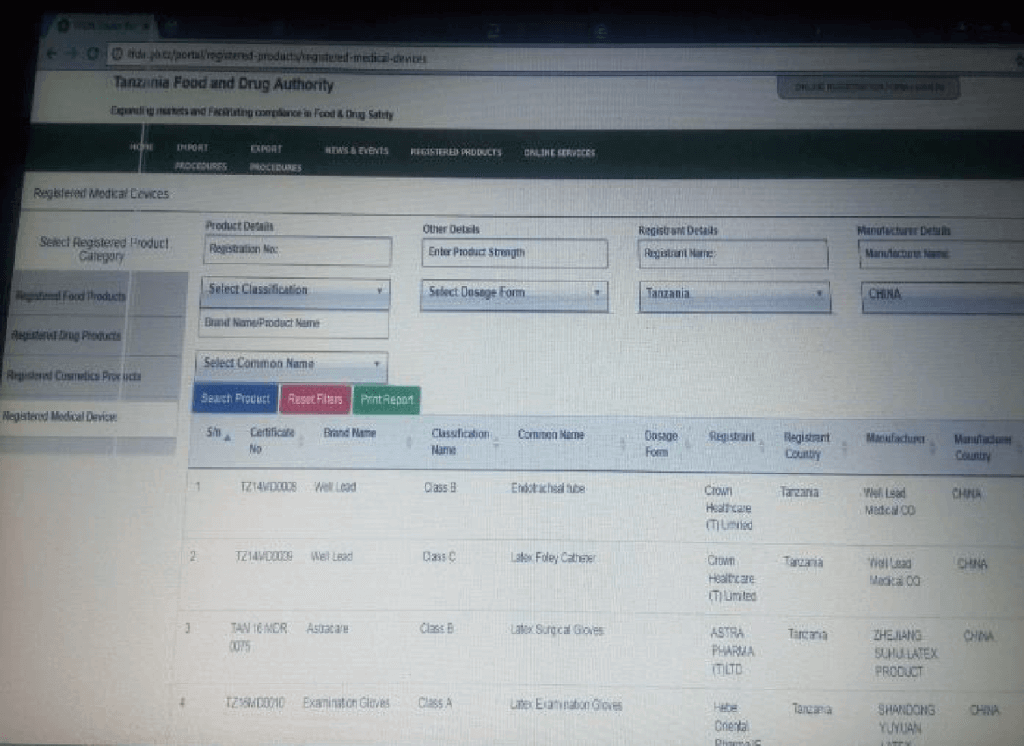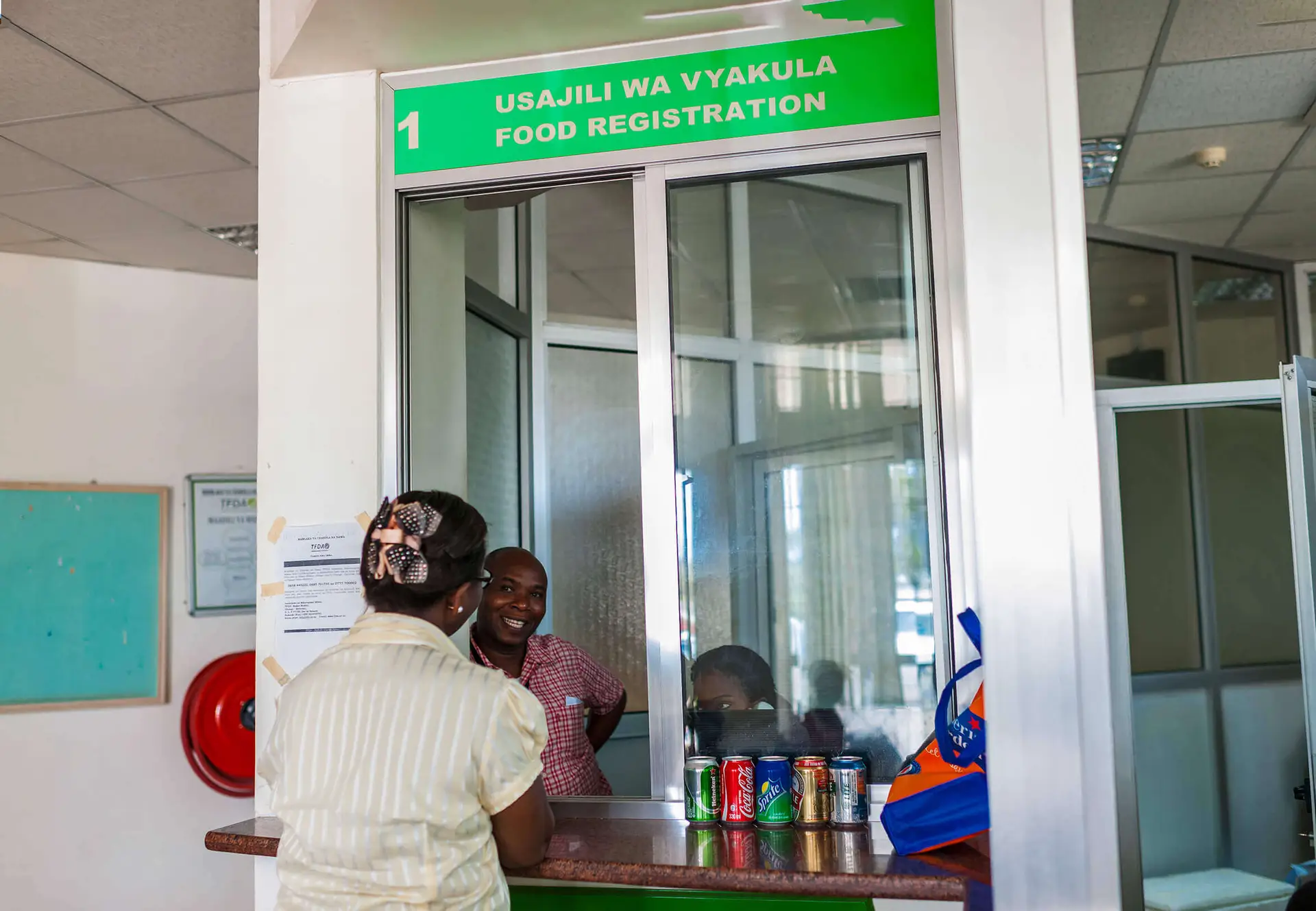BACKGROUND
TFDA began its operations as a regulatory body on 1st July 2003 and is mandated to regulate the quality, safety and efficacy of food, medicines, cosmetics and medical devices which is provided for under the Tanzania Food, Drugs and Cosmetics Act, Cap 219. Since its inception, TFDA has attained notable achievements in regulating the quality, safety and efficacy of food, medicines, cosmetics and medical devices. Amongst its achievements, TFDA has developed robust systems and put in place guidelines for registration of products, inspection and surveillance as well as laboratory analysis of product samples prior to market authorization.
This case study focuses on the improvements that Tanzania Food and Drug Authority (TFDA) has made in enhancing trade in Tanzania through the automation of their key trade process with support from TMA. The TMA support towards automation of key trade process at TFDA began in 2012 at a tune US $ 285,000 and is expected to end in 2017. The automated system at TFDA serves its stakeholders in registration, regulation and monitoring of food, medicines, cosmetics, medical devices and premises in Tanzania. The expected outcome of the TMA intervention at TFDA was to increase efficiency through time and cost saving for TFDA and its stakeholders as the portal eliminates the need for physical presence of customers at TFDA offices, promotes transparency and accountability by TFDA and its customers which in the long run enhance and promotes trade.
THE ISSUE
The method of services deliver at TFDA to its stakeholders needed to be improved so as to meet the expectations and needs of their stakeholders in terms of reducing the import and export transaction time and cost which would help speed up the processes for registration, importing and exporting which was affecting trade. In addition, there was a need to increase the levels of transparency, accountability and regulatory compliance to the requirements of TFDA regarding services offered.
THE RESPONSE AND APPROACH
Over a period of almost four years, TMA has been engaging with different partners in the area of trade and transport facilitation to come up with innovative solutions that will enhance the capacity and quality of trade within the East African Community (EAC). One of the means that TMA and its partners were using to realize these objectives and in particular, enhanced trade environment was to come up with effective trade systems and processes that were anchored in fully automating/computerizing/digitizing the processes and workflow of trade agencies or organizations within the region. The outcomes of this endeavour were the development and implementation of Information Portals (IP) and Management Information Systems (MIS) for smaller agencies and organizations that would ultimately link/interface to the National Electronic Single Windows. This programme known as Single Window Information for Trade (SWIFT) was working with import/export agencies as well as the private sector to automate their trade facilitation business processes and set up trading regulations information portals, thus enabling easier access to information and online forms for the trading community.
3.1 PROJECT GOALS
The TMA SWIFT projects interventions aimed at achieving the following:
e) Enhancing availability and handling of information.
f) Simplifying and expediting information flows between traders and government.
g) Achieving greater harmonization and better sharing of relevant trade data across governmental systems and
h) Bringing meaningful gains to all parties involved in cross-border trade and ultimately resulting in improved efficiency and effectiveness in the administration of regulatory trade documents and reduce costs both for Governments and for traders due to better use of resources.
3.2 INNOVATIONS IN THE PROJECT
With support from TMA, TFDA was able to develop a content management system consisting of an integrated database of existing rules, procedures, legislation and regulations governing the import/export of food, drugs, medical devices and cosmetics in Tanzania. This database was envisioned to be an important reference point for import/export traders as they prepare to engage in trading activities both domestically and internationally. The database helped in sensitizing traders on import/export requirements including licensing requirements hence making them better informed of the import/export procedures.
The system formed a critical component of the Single Window concept within the region by providing a one-stop location for all information required by traders to do their business especially in relation to food, medical devices, cosmetics and drugs with Tanzania and within the East African region. With the same support from TMA a workflow based management information system (MIS) to manage and report on the application and management of licenses, certificates and permits and all processes related to delivery of the same including and not limited to food, drugs, cosmetics, medical devices and premises registration was developed.
3.3 STAKEHOLDERS
The Intended stakeholders for this initiative were: TFDA, importers and exporters of food, drugs, medical devices and cosmetics in Tanzania, TMA team and the software developers of the automated system.
3.4 RESULTS ACHIEVED
The results so far achieved by the TFDA automates systems were:
a) The developed system involved (trade portal, Management Information System (MIS) and Laboratory Integrated Management Information System (LIMS).
b) The average processing time for issuing Import/Export Permit reduced by 99% from 135 hours in 2012 to 2 hours in 2016
c) The average processing cost for issuing an Import/Export Permit reduced by 88% from US$ 80 in 2012 to US$ 10 in 2016.
d) The LIMS integration deployed and live and the number of Processes automated, were 4 which include Product, Premise, GMP and Import Export modules.
e) 103 stakeholders had been trained.
f) There were 11,586 approved transactions through the e-portal.
OPPORTUNITIES AND CHALLENGES
Having an automated systems has created an opportunity for the TFDA to be able to increase compliance to regulatory requirements, transparency and accountability by stakeholders regarding services offered by TFDA. The has improved on the efficiency in decision making, supported the work flow management and also reduced time and cost of processing the import and export permits which is also creating opportunities for the importers and exports to export and import more products.
4.1 LESSONS LEARNED
a) Before full implementation of the SWIFT project at TFDA, the ground was well prepared, stakeholders brought on board and internal TFDA capacity built through training activities which provided for sufficient preparation time and project acceptability.
b) Strong political will at the highest levels and commitment to the process of automating the trade process at TFDA was one of the most important success factors of the project.
4.2 CHALLENGES
The beneficiaries using the TFDA automated systems raised the following challenges:
a) The e-portal was only in use during official working hours and yet private sector business goes on even beyond official working hours.
b) Some product imported and exported were not included in the systems data base.
c) There was no option to preview before submission of documents and there was no notification once submission of documents was done.
BENEFICIARY PROFILE

This case study focused on MacNaughton Limited as one of the stakeholders that frequently use the automated system at TFDA. The MacNaughton Limited management team is made up of experienced and dedicated individuals who share a common interest in making quality and affordable pharmaceuticals and hospital consumables available in Tanzania. The company’s strengths lie in its reputation for meeting commitments, the caliber of its field staff, team work and good customer relations. This company has the vision of becoming a major player in the pharmaceutical industry in the East African Community.
MacNaughton revealed that being a big company that deals in pharmaceuticals and hospital consumables, they serve a big market in Tanzania and any delays in the clearance of their goods affects their business. They further said that before the automation of the system they were incurring a lot of transaction expenses in terms of movement from their offices to TFDA. They added that these movements were time consuming and in the long run were affecting their business.
When information reached them, that the system at TFDA was being automated and will be processing and issuing Import/Export Permit electronically, they were happy with the innovation at TFDA. They revealed that the document processing time at TFDA had reduced from about two days to within one day and the cost had reduced from about US$100 to US$27. This initiative was one of the long awaited innovations that MacNaughton said added value to their business operation. The automated system (e-portal) helped them reduce the time for going to TFDA for the purpose of products registration because it is now done online, however they only needed to go there for only the purpose of payment issues. MacNaughton further narrated that it was now easier to access information and documents through e-portal. They also appreciated the work and efficiency at TFDA and said that the system has helped to speed up the process of registration, importing and exporting of different products and all this is contributing to enhanced trade. MacNaughton also stressed that they would have loved to see the TFDA automated system operate even past official working hours and that TFDA should continue improving and enhancing the systems so as to serve them and the general public better.


